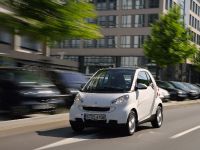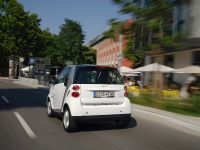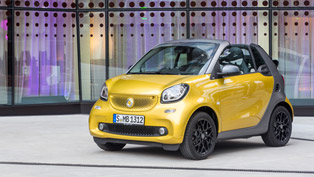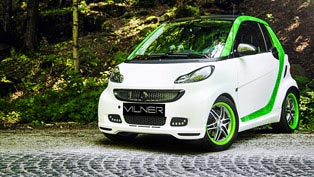Smart Fortwo MHD is the Most Inexpensive Way of Running a Car
The smart fortwo is still Germany's most cost-efficient car. This is the conclusion reached by experts from the prestigious market observer EurotaxSchwacke after analysing 16 vehicles in the mini car class. They confirm previous cost calculations by numerous trade magazines and the ADAC, Germany's largest automobile club. Owners of a smart fortwo mhd save around €1,700 in running costs compared with the most expensive model in this class.
The smart fortwo tops the ranking of low cost vehicles once again. After auto motor und sport, Auto Bild, Autozeitung and the ADAC, now EurotaxSchwacke GmbH also confirms that the smart two-seater has the lowest running costs in the mini car category. No other car is cheaper to run in Germany.
In the latest examination the experts compared the running costs of 16 vehicles from the mini car segment. They found that it costs €27.52 to drive a smart fortwo coupé pure mhd (micro hybrid drive) 100 kilometres. For comparative purposes: the most expensive model tested costs €38.88 per 100 kilometres. With an annual mileage of 15,000 kilometres this means that smart drivers save approximately €1,700 per year.
In addition to tax, insurance and fuel, the complex calculation of the total costs also considered wearing parts, maintenance, repairs and the vehicle's loss of value for an ownership period of 36 months and a mileage of 45,000 kilometres. "The running costs are also an important factor to consider when choosing a vehicle", says Martin Verrelli, Managing Director of EurotaxSchwacke GmbH. "Otherwise there is a great risk of a supposedly low-priced purchase turning into a flop." The EurotaxSchwacke calculations provide impressive real-world proof of the savings potential of smart's micro hybrid drive technology, which has been successfully deployed in production vehicles since 2007.
To reduce the fuel costs of the smart fortwo even further, from October 2008 the two petrol models with 45 kW/61 bhp and 52 kW/71 bhp engines will be equipped with mhd technology as standard. This reduces the fuel consumption of both versions by around eight percent to 4.3* litres in accordance with the New European Driving Cycle (NEDC). CO2 emissions are reduced to 103 grams* per kilometre. Savings of up to 19 percent are possible in urban traffic with frequent stop-and-go situations. This means that in future 7 out of 10 customers in Europe who choose a petrol model will be able to take advantage of this environmentally friendly technology.
Smart has implemented the automatic start/stop system in a particularly ingenious way: the control electronics shut down the engine as soon as the driver brakes and the vehicle's speed falls below 8 km/h – for example when approaching traffic lights. The engine starts again in the fraction of a second when the driver releases the brake pedal. The predictive engine shut-down effectively lengthens the time without fuel consumption.
The system is optimised for the smart fortwo's automated manual transmission and is fully automatic – no clutchwork or gear shifting are needed. mhd technology is extremely well suited to the urban use patterns of smart fortwo customers and makes it particularly easy to save fuel and emissions.









